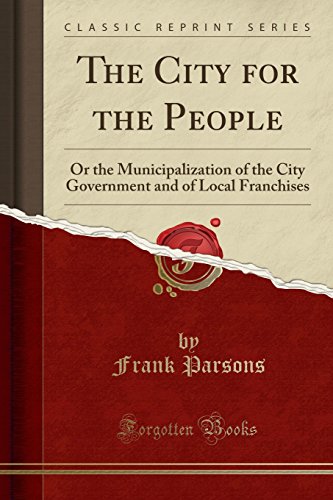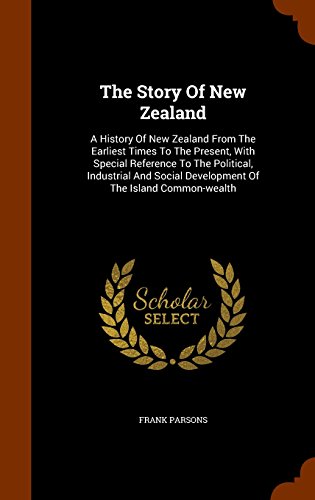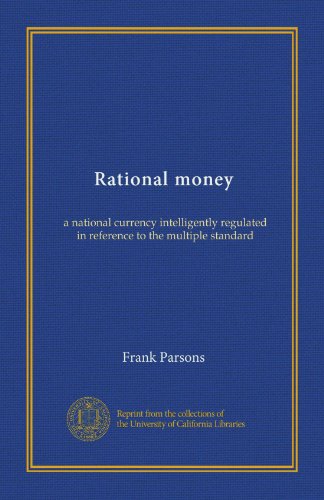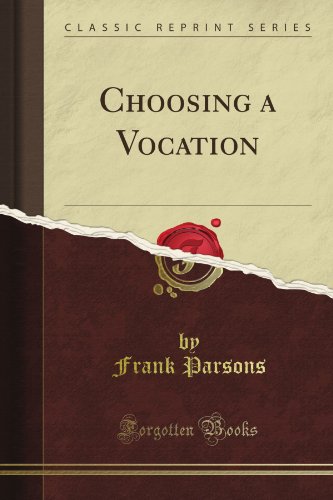Background
Frank Parsons was born on November 14, 1854, in Mount Holly, N. J. , of Scotch-Irish and English parents.



(Excerpt from The City for the People: Or the Municipaliza...)
Excerpt from The City for the People: Or the Municipalization of the City Government and of Local Franchises The volume was begun at the request of Dr. Taylor; its general plan is substantially the one proposed by him, and in the work ing out of the plan his criticisms and suggestions have been of the greatest value. Some repetition has resulted from the effort to do justice to each topic in its turn, but we think the reader will find this method very favorable to a thoro grasp of the subjects treated. About the Publisher Forgotten Books publishes hundreds of thousands of rare and classic books. Find more at www.forgottenbooks.com This book is a reproduction of an important historical work. Forgotten Books uses state-of-the-art technology to digitally reconstruct the work, preserving the original format whilst repairing imperfections present in the aged copy. In rare cases, an imperfection in the original, such as a blemish or missing page, may be replicated in our edition. We do, however, repair the vast majority of imperfections successfully; any imperfections that remain are intentionally left to preserve the state of such historical works.
http://www.amazon.com/gp/product/1331274850/?tag=2022091-20

(This work has been selected by scholars as being cultural...)
This work has been selected by scholars as being culturally important, and is part of the knowledge base of civilization as we know it. This work was reproduced from the original artifact, and remains as true to the original work as possible. Therefore, you will see the original copyright references, library stamps (as most of these works have been housed in our most important libraries around the world), and other notations in the work. This work is in the public domain in the United States of America, and possibly other nations. Within the United States, you may freely copy and distribute this work, as no entity (individual or corporate) has a copyright on the body of the work. As a reproduction of a historical artifact, this work may contain missing or blurred pages, poor pictures, errant marks, etc. Scholars believe, and we concur, that this work is important enough to be preserved, reproduced, and made generally available to the public. We appreciate your support of the preservation process, and thank you for being an important part of keeping this knowledge alive and relevant.
http://www.amazon.com/gp/product/1343814863/?tag=2022091-20

(This book was digitized and reprinted from the collection...)
This book was digitized and reprinted from the collections of the University of California Libraries. It was produced from digital images created through the libraries mass digitization efforts. The digital images were cleaned and prepared for printing through automated processes. Despite the cleaning process, occasional flaws may still be present that were part of the original work itself, or introduced during digitization. This book and hundreds of thousands of others can be found online in the HathiTrust Digital Library at www.hathitrust.org.
http://www.amazon.com/gp/product/B0068M0AQ8/?tag=2022091-20

(Professor Parsons died. For a year prior to his death he ...)
Professor Parsons died. For a year prior to his death he had given a large part of his time to Vocation Bureau work. Some of the material here used appeared in articles inT he A rena, and a number of the cases in Part III have been published in the daily papers of Boston and New York. The appearance of these articles brought hundreds of letters of inquiry from all parts of the United States, expressing interest in the effort to give scientific vocational counsel to the young. That Professor Parsons would have carried the plan to a greater completeness had he lived, there is no doubt; but the work that he did do is of such value that it is believed many will be grateful to get such information about it as can be given in this volume. Whatever doubts there may be of the practicability of giving expert vocational counsel to young men and women, there are certain simple truths upon which the plan is based, and which I believe no one will deny. 1. It is better to choose a vocation than merely to hunt a job. 2. No one should choose a vocation without careful self-analysis, thorough, honest, and under guidance. 3. The youth should have a large survey of the field of vocations, and not simply drop into the convenient or accidental position. 4. (Typographical errors above are due to OCR software and don't occur in the book.) About the Publisher Forgotten Books is a publisher of historical writings, such as: Philosophy, Classics, Science, Religion, History, Folklore and Mythology. Forgotten Books' Classic Reprint Series utilizes the latest technology to regenerate facsimiles of historically important writings. Careful attention has been made to accurately preserve the original format of each page whilst digitally enhancing the aged text. Read books online for free at www.forgottenbooks.org
http://www.amazon.com/gp/product/B008CA46Z0/?tag=2022091-20
Frank Parsons was born on November 14, 1854, in Mount Holly, N. J. , of Scotch-Irish and English parents.
A brilliant student, he entered Cornell University at the age of 15, graduating first in his class 3 years later with a degree in civil engineering. After working with a railroad that went bankrupt, he taught school at Southbridge, Mass. He decided that he needed a law degree and completed 3 years of study in a year, passing the bar examination in 1881. The effort damaged his health; he spent 3 years in New Mexico for renewal.
Persons entered law practice in Boston but found it unsatisfying. He joined a publisher, for whom he prepared legal textbooks. While formulating a social philosophy which would result in a spectacular outpouring of writings and social efforts, he developed habits of reading and social contacts that affected his later career. Thus his lectures on English literature, given over several years at Boston's Young Men's Christian Association, became his successful The World's Best Books (1889). In 1892 he assumed a lectureship at Boston University, which he held until 1905.
In Our Country's Need (1894) Parsons formulated his views of "mutualism, " which attempted to reconcile individual liberty and socialism. Influenced by England's Herbert Spencer and by America's Edward Bellamy and "Christian socialism, " Parsons sought to devise ways of controlling such basic institutions as the telegraph and the railroad, while honoring private industry and individual initiative. He combined radicalism and conservatism. Rational Money (1898), The Telegraph Monopoly (1899), The City for the People (1899), and Direct Legislation (1900) established him as an earnest and competent social critic.
From 1897 to 1899, while maintaining his Boston connections, Parsons was also a professor at Kansas State Agricultural College, radicalized by the Populist party's success in that state. When a change in administration cost him and his associates their positions, they founded Ruskin College of Social Science at Trenton, Mo. , with Parsons as a dean and professor. After this idealistic venture failed, Parsons returned to Boston. He became deeply involved in numerous reform causes and traveled across country and to Europe. He advised the progressive owner of Filene's Department Store in Boston on adding cooperative features to his personnel policies, and he was involved in building the Civic Service Home, a settlement aiding immigrant groups. In 1905 he helped organize the Breadwinner's Institute, which offered education and a diploma to the poor.
Parsons' The Story of New Zealand (1904), The Trusts, the Railroads, and the People (1906), The Heart of the Railroad Problem (1906), and his constant flow of articles made him an outstanding academic voice for progressivism, but contributed to the debilitation which caused his death on Sept. 26, 1908. Published posthumously were his Choosing a Vocation (1909), a pioneer work in the vocational field, and Legal Doctrine and Social Progress (1911).
As a leading social commentator of the Progressive Era, Parsons authored a dozen books and more than 125 magazine and journal articles on a wide range of reform topics, including currency reform, regulation of monopolies, municipal ownership, establishment of direct democracy, and other matters. Parsons is also widely regarded as the father of the vocational guidance movement.
Parsons' papers are housed at Yale University Library in New Haven, Connecticut.
(Excerpt from The City for the People: Or the Municipaliza...)
(This work has been selected by scholars as being cultural...)
(This book was digitized and reprinted from the collection...)
(Professor Parsons died. For a year prior to his death he ...)
